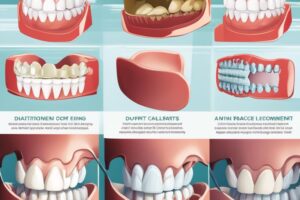Are you in need of a dental treatment or procedure but unsure of what options are available to you? You’re not alone. There are numerous types of dental treatments and procedures that can address a wide range of dental issues. From routine cleanings and fillings to more complex treatments like dental implants and root canals, it’s important to have a good understanding of what each treatment entails and which one is best suited for your specific needs. In this blog post, we will explore the different types of dental treatments and procedures available to you, highlighting the most important factors for each and providing you with the information you need to make well-informed decisions about your dental health.
Key Takeaways:
- Regular dental check-ups are essential for maintaining oral health and preventing potential dental issues.
- Prophylaxis (dental cleaning) is crucial for removing tartar and plaque that can lead to gum disease and cavities.
- Restorative treatments such as fillings, crowns, and bridges can help restore the function and aesthetics of damaged teeth.
- Orthodontic procedures like braces and Invisalign are used to correct misaligned teeth and improve bite alignment.
- Advanced treatments like dental implants, root canals, and oral surgery can address more complex dental issues and restore oral health.
Preventive Dental Treatments
The key to maintaining good oral health is to prevent problems before they start. Preventive dental treatments are designed to keep your teeth and gums healthy and free from disease. By taking care of your teeth and gums, you can avoid the need for more invasive and costly dental procedures in the future.
Dental Cleanings and Examinations
Regular dental cleanings and examinations are essential for keeping your teeth and gums healthy. During a cleaning, your dentist will remove plaque and tartar buildup, which can lead to tooth decay and gum disease if left untreated. Your dentist will also check for any signs of cavities, gum disease, or other dental problems. By visiting your dentist for regular cleanings and exams, you can catch any issues early and keep your smile healthy.
Dental Sealants
Dental sealants are a protective coating that is applied to the chewing surfaces of your back teeth. This can help prevent cavities by sealing out food and bacteria that can get trapped in the grooves of your teeth. Sealants are especially beneficial for children, as they can protect their teeth during the cavity-prone years of ages 6 to 14. However, adults can also benefit from dental sealants, as they can help protect against tooth decay and the need for fillings.
Fluoride Treatments
Fluoride treatments are a simple and effective way to strengthen your teeth and prevent tooth decay. Fluoride is a mineral that can remineralize your tooth enamel and make it more resistant to acid and bacteria. Your dentist may recommend fluoride treatments as part of your regular dental care, especially if you are at a higher risk of developing cavities. By incorporating fluoride into your oral health routine, you can keep your teeth strong and healthy.
Restorative Dental Procedures
Assuming you have experienced tooth decay, injury, or tooth loss, restorative dental procedures are essential to repair and replace damaged or missing teeth. These procedures aim to restore the function and aesthetics of your smile, promoting your overall oral health.
Dental Fillings
When you have a cavity, your dentist will recommend dental fillings to restore the damaged tooth. The decayed portion of your tooth is removed, and a filling material is used to fill the space, preventing further decay and restoring the structural integrity of the tooth. It is a relatively simple procedure, and the material used for fillings can be tooth-colored, blending seamlessly with your natural teeth.
Crowns and Bridges
If you have a severely damaged or missing tooth, your dentist may suggest crowns or bridges to restore your smile. Crowns are used to cover a damaged tooth, while bridges are used to replace one or more missing teeth by anchoring them to the adjacent natural teeth. Crowns and bridges not only improve the aesthetic appearance of your smile but also restore your ability to chew and speak properly.
Dentures
If you have multiple missing teeth, dentures are an effective solution to restore your smile and improve your ability to speak and eat. Dentures are custom-made replacements for missing teeth, and they can be either partial or complete, depending on your specific needs. Wearing dentures can significantly improve your confidence and quality of life.
Root Canal Therapy
When the pulp of your tooth becomes infected or inflamed, you may require root canal therapy to save the tooth and prevent further damage. During this procedure, the infected pulp is removed, and the inside of the tooth is cleaned and sealed. Root canal therapy can alleviate severe tooth pain and save your natural tooth from extraction, preserving your natural smile.
Cosmetic Dentistry
Not satisfied with the appearance of your teeth? Cosmetic dentistry offers a range of treatments to enhance the aesthetics of your smile, giving you the confidence to show off your pearly whites.
Teeth Whitening
If you find that your teeth have become discolored or stained over time, professional teeth whitening can restore their natural brightness. This procedure involves the use of bleaching agents to remove stains and lighten the color of your teeth. You can choose between in-office treatments for immediate results or take-home kits for convenience.
Veneers
For a more permanent solution to discoloration, chips, or gaps in your teeth, veneers are a popular choice. These thin, custom-made shells are bonded to the front of your teeth to improve their color and shape, giving you a natural and long-lasting smile transformation.
Bonding
If you have teeth that are chipped, cracked, or misshapen, bonding can be an effective solution. Your dentist will apply a tooth-colored resin to the affected area and sculpt it to the desired shape. This quick and painless procedure can improve the appearance of your teeth in just one visit.
Orthodontics
If you have crooked or misaligned teeth, orthodontic treatments such as braces or clear aligners can help you achieve a straight and properly aligned smile. Whether you’re a teenager or an adult, these corrective treatments can significantly improve your dental health and overall confidence.
Dental Surgery
For certain dental issues, more extensive treatment may be required, which may involve dental surgery. This can include procedures such as tooth extractions, dental implants, and periodontal surgery. These procedures are performed by qualified dental surgeons and are typically done under local anesthesia to minimize discomfort. Here are some common types of dental surgery you may encounter.
Tooth Extractions
If you have a severely damaged or infected tooth that cannot be saved through other treatments, tooth extraction may be necessary. During this procedure, your dentist or oral surgeon will carefully remove the affected tooth from its socket in the jawbone. This may be done for impacted wisdom teeth, severely decayed teeth, or teeth that are causing crowding or other issues in your mouth. While tooth extractions may sound intimidating, advances in dental technology have made the procedure much more comfortable and less invasive than in the past.
Dental Implants
Dental implants are a popular option for replacing missing teeth. This surgery involves the placement of a titanium implant into the jawbone, which serves as a stable foundation for a replacement tooth or teeth. Dental implants are a durable and long-lasting solution that can improve the function and appearance of your smile. While the process of getting dental implants may take several months to complete, the results are often well worth the wait.
Periodontal Surgery
If you have advanced gum disease that has caused significant damage to the bone and tissues supporting your teeth, periodontal surgery may be necessary to restore your oral health. This can involve procedures such as gum grafts, bone grafts, or pocket reduction surgery to address the damage caused by periodontitis. Periodontal surgery can help prevent tooth loss and improve the overall health of your smile.
Specialized Dental Treatments
Keep up with your oral health by staying informed about the different types of specialized dental treatments available to you. Whether you need expert care for your children, advanced reconstruction of your teeth, or surgical procedures, there are specialized dental treatments that cater to your specific needs. If you’re interested in learning more about common dental procedures, visit Common Procedures – Branford Dental Care.
Pediatric Dentistry
Pediatric dentistry focuses on the dental health of children from infancy through the teenage years. This area of dentistry is essential for the development of your child’s oral health. Pediatric dentists are trained to manage and care for the unique dental needs of children, including those with special medical conditions. Regular check-ups with a pediatric dentist are important to ensure that your child’s primary and permanent teeth stay healthy and free of dental issues.
Endodontics
Endodontics is the branch of dentistry that deals with the inner tissues of the teeth, particularly the dental pulp and surrounding tissues. If you are experiencing severe tooth pain, increased sensitivity to hot or cold, or have a deep cavity, you may require endodontic treatment. This could involve root canal therapy to save a tooth that has suffered irreversible damage to its nerve.
Prosthodontics
Prosthodontics is the dental specialty pertaining to the diagnosis, treatment planning, rehabilitation, and maintenance of the oral function, comfort, appearance, and health of patients with clinical conditions associated with missing or deficient teeth and/or oral and maxillofacial tissues. Prosthodontists are experts in the restoration and replacement of teeth, making them ideal for individuals who need advanced dental reconstruction or tooth replacement. This may include the fitting of dentures, bridges, or dental implants.
Oral and Maxillofacial Surgeries
Oral and maxillofacial surgery encompasses a wide range of procedures including extractions, dental implants, and corrective jaw surgeries. These procedures may be necessary to address various issues such as impacted wisdom teeth, misaligned jaws, or facial trauma. Oral and maxillofacial surgeons are trained to perform both surgical and non-surgical procedures, utilizing the latest techniques and technologies to provide you with the best possible outcomes.
Conclusively
Understanding the different types of dental treatments and procedures is essential for maintaining good oral health. From routine cleanings and fillings to more complex procedures like root canals and dental implants, it’s important to stay informed about your options and what they entail. By staying proactive about your dental care, you can ensure that you receive the appropriate treatment for your individual needs and maintain a healthy, happy smile for years to come.
FAQ
Q: What are the different types of dental treatments and procedures?
A: There are several different types of dental treatments and procedures, including routine cleanings, fillings, root canals, crowns and bridges, dental implants, orthodontic treatment, and oral surgeries. Each treatment serves a specific purpose in maintaining oral health and addressing dental issues.
Q: How often should I visit the dentist for dental treatments?
A: It is recommended to visit the dentist for routine cleanings and check-ups at least every six months. However, the frequency of dental treatments may vary depending on individual oral health needs and any ongoing dental issues. Your dentist will provide personalized recommendations for the frequency of your dental visits based on your oral health.
Q: Are dental treatments and procedures painful?
A: Many dental treatments and procedures are performed with local anesthesia to minimize discomfort. Patients may experience minor discomfort or sensitivity during certain procedures, but advances in dental technology and techniques have made dental treatments significantly more comfortable than in the past. Your dentist will ensure that you are as comfortable as possible during any dental treatment or procedure.







